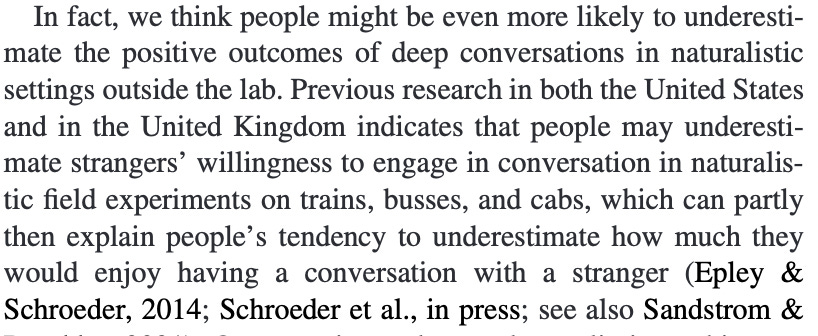People Overestimate Awkwardness of Deep Convos With Strangers, Study Finds
New research shows that although people crave more connective relationships, they often overestimate the level of awkwardness and unpleasant feelings that will be associated with engaging in more meaningful conversations with strangers.
A paper published online in the Journal of Personality and Social Psychology called, Overly Shallow? Miscalibrated Expectations Create Barrier to Deeper Conversation, took over 1800 participants and grouped them into pairs. Each pair of people ask questions to one another that ranged in intimacy level.
Deep conversations were defined as conversations where the people are self-disclosing personal intimate information about their thoughts, feelings or experiences. Whereas shallow interactions were built on questions where participants did not reveal anything vulnerable.
The research paper explained how past studies have shown that people who engage in deeper conversations speed up development of close relationships, have stronger social ties, they’re relieved from burdens of secrecy or negative emotional experiences, and are generally happier than those who just have small talk.
So the question was asked:
“With all the positive outcomes that spring from deep talk, what keeps people from having more of it in their everyday lives?”
From, Overly Shallow? Miscalibrated Expectations Create Barrier to Deeper Conversation
The conclusion was that most people think asking the deeper questions is going to yield feelings of awkwardness. And most people underestimate how much another person would care about the details of their life. Furthermore, they underestimated how much they truly would care about others' lives.
After the conversations took place there were stronger feelings of connectedness and happiness than expected.
There were some limitations in the experiment however, considering everyone that took part in the study had signed up to do so. Being in a real life scenario at the grocery store may yield different results. That being said the authors actually believe that people might be more open in real life scenarios to engage in deeper conversation because it comes about more authentically.
The paper also exposes that people seem to be reluctant to talk to strangers, give a compliment, express gratitude, do a random act of kindness or disclose personal information partly because they underestimate the positive impact they can have on other people.
Yet these are the very things that contribute to overall well-being in humans.
For those who feel overwhelmed by this information and feel fear around engaging in deeper conversations there is some good news.
Yes, in some of the experiment groups there was clear evidence that those who took part in deeper conversation experienced more connectedness and happiness than those who took part in shallow conversations. However, in some groups there was not a large difference which can also suggest that people in general just like connecting.
That being said in all scenarios across the board people underestimating how much happiness the conversation would bring, meaning making any effort can increase connectivity and happiness.
Finally, people felt more willing to engage in conversation with those who seemed to be caring and interested in them.
Actionable Takeaway: Check out the list of questions below that were used in the experiment. The questions get increasingly deeper and more intimate. Try asking the questions to people in different scenarios and see what happens.




